CEUs are Available including MFTs, MSWs, LCSWs
CLINICAL TRAINING FOR PROFESSIONALS & STUDENTS: Click Here
CALENDAR OF WORKSHOPS & TRAININGS: Click Here
Workshop and Training Descriptions

Wise Mind Open Mind: Accessing Your Core Creativity & Inner Resources
Pioneering psychotherapist and teacher, Ronald Alexander uses ancient Buddhist mindfulness practices and tools from creative psychology to show how you can create a new personal vision that can weather the storms of change and upheaval. He invites you to join him to learn how to access the inner resources of your Core Creativity—trust, comfort, time and curiosity. This state of consciousness increases self-awareness, promotes insight, wellness, and individuation.
Learn how to:
- Transform painful, afflictive, and destructive emotions into wholesome, positive ones
- Access your core creative unconscious to open new possibilities for living, loving, working, and relating
- See crises and loss as symbolic cycles of death and rebirth, renewal and change
- Identify resistance, the hindrances of the mind, and their payoffs
- Move through the Three Cycles for Change
- Use the Art of Creative Transformation for enlivening a fresh, unique, and more positive future.
Working with mindfulness meditation, Somatic Experiencing, Gestalt practice, Ericksonian trance, music, creative writing, breathing techniques, and more, you will open yourself to joy, contentment, and vitality.
Recommended Reading: Ronald Alexander, Wise Mind, Open Mind: Finding Purpose and Meaning in Times of Crisis, Loss and Change (New Harbinger Publications).

Igniting Your Creativity and Passion
“The journey of 10,000 miles begins with one step”. – Ancient Taoist proverb
All of life’s conflicts can be described as a struggle between letting go or holding on, opening to the present or clinging to the past, expansion or contraction. Life’s journey is a series of challenges that confront the self with difficult yet highly purposeful choices. The Ego clings to the “familiar” long after the nourishment has run dry. At this point, we face our deepest fears—and truths. Our matriculation through the mystery of life asks that our soul awaken, take courage, and choose a more passionate life.
When we enter into the essence of our true nature and heed its call, we undergo a death/rebirth of the self. We journey into the unconscious to de-structure the Ego and reemerge with a freer self and life path. This encounter with our underworld guides us toward our inner fire for a more creative and soulful way of living in the unknown. Referred to as the Hero’s Journey, this is the ancient initiatory process of transition and self-transformation.
This workshop is for those seeking to ignite the flame of creative change. You will have the opportunity to deeply explore your pattern of holding on, of not moving forward with your life’s calling. The workshop will use the healing power of the circle, Gestalt Practice, trancework, principles of self and Buddhist psychology, mindfulness meditation, tarot cards as instruments for change, mind-body healing practices, and deep music to begin the initiation into the sacred rites of passage. You will leave this workshop with a creative roadmap for navigating the states of Wise Mind, Big Mind and Open Mind.
This course may be especially useful for those in the helping professions seeking new skills.
Recommended Reading: Alexander, Ronald, Wise Mind Open Mind; Campbell, Joseph, The Companion’s Guide; Banzhaf, Tajo, Tarot & The Hero’s Journey; Whitmont, Edward, The Alchemy of Healing: Psyche & Soma.

The Buddha’s Toolkit: Awaken Your Body’s Wisdom
We all have the capability to access our intuition and inner resources for healing – we just need the tools to tap into their power!
Through breathing exercises, mindfulness meditations, state of the art visualizations and mind-body healing exercises participants will be taught how to activate their physiological and psychological energies (the neurobiology and psychobiology advances of mind-body healing) that lead to direct experience of the powerful states of ‘Big Mind,’ ‘Open Mind’ and ‘Open Heart.’ These states penetrate into the reality of our Core Self, awakening healthy and creative aspects of the unconscious mind. Also included are breakthroughs in creative thinking, mindfulness exercises and Buddhist antidote remedies to help shift unwholesome beliefs to positive action steps for transforming the mind, brain, body, and mood states.
The Buddha’s Toolkit will help participants to:
- Learn how to calm their minds
- Develop trust with their unconscious
- Explore their intuition and internal healing resources
- Learn how to tap into their core creativity
- Develop fresh new insights
The outcome? With these tools participants will be able to ignite their inner passions and creativity, develop a sense of wholeness, compassion and happiness to enjoy a more balanced, free, and expanded life. This workshop is designed for anyone from beginning to advanced.
Recommended Reading: Ronald Alexander, Wise Mind, Open Mind (New Harbinger Publications); Goldstein and Kornfield, Seeking the Heart of Wisdom; Epstein, Mark, Thoughts without a Thinker; Suzuki, Shunryu, Zen Mind, Beginner’s Mind; Rossi, E. The Psychobiology of Mind-Body Healing; Eckhart Tolle, The Power of Now.
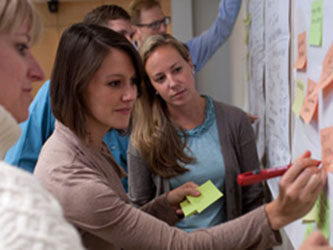
On Becoming a Group Leader
The archetypal leader is a blend of “transformer” and “meaning translator.” The transformer creates a sacred space for exploring Rhythms, moods, flows, and interactions. The meaning translator brings clarity, order, and awareness to the conscious and unconscious processes within the group culture. Effective leadership begins with fostering openness to explore safety, trust, and support.
The focus of this workshop is on becoming a leader who can create that openness and artfully manage a group in any setting. The topics include recovering from challenges and fragmentation; navigating transference; resolving conflict and confrontation; and handling the difficult group member. Participants will learn methods to self-activate, overcome fear and embrace creativity.
Sessions include mini-lectures, open seatwork, and group process using Gestalt Practice, existential therapy, contemporary psychoanalytic perspectives, family systems, mind/body approaches, and group dynamics. As the workshop progresses participants will have the opportunity to lead or co-lead the group under supervision.
This workshop is particularly useful for mental-health practitioners , organizational consultants, family-owned business entrepreneurs, and others who manage groups.
Recommended Reading: Ronald Alexander, Wise Mind, Open Mind (New Harbinger Publications); Heider, The Tao of Leadership; Yalom, The Theory and Practice of Group Psychotherapy; Polster, Gestalt Therapy Integrated; Simkin, Gestalt Therapy Mini-lectures; Bion, Experiences in Groups.
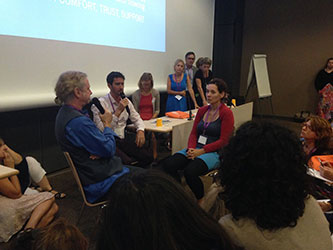
Zen and Psychotherapy: New Integrations in Mind-Body Healing
This workshop will combine intensive group work, with didactic discussions, supervision of therapist-client dyads, and clinical demonstrations. Full spectrum treatment cartography will be used to clarify how Zen, Gestalt Therapy, Psychoanalytic Self Psychology and Ericksonian Hypnotherapy can be effectively integrated to address neurotic conflict, trauma, somatic illness, narcissistic issues of the self, and contact boundary disturbances. Emphasis will be on:
- Existential and Brief Therapies that are cost efficient.
- Support for becoming more effective with tracking Transference and counter transference issues.
- Improving intervention skills as they relate to:
- Handling of resistance and grounding therapists anxieties.
- The nurturing of the Real Self and utilization of the Core Self.
- Facilitation and activation of unconscious healing process through the use of metaphor and guided imagery.
- Use of metaphor and guided imagery.
- Developing skills with mirroring, pacing, and the language of mind-body healing.
- Development of the Mind Set of the therapist-supporting therapists in developing skills of attention, perception and observation of the mind.
- Development of healing transitions between the brain mind-body pathways.
We will address this training experience using methods derived from Zen, martial arts, Psychodynamics Theory and practice, Ericksonian Hypnotherapy and Gestalt Therapy. Sessions will include deep music, meditation, process work and physical re-pattering exercises.
Recommended Readings: Ronald Alexander, Wise Mind, Open Mind (New Harbinger Publications); Contexts of Being by Stolorow, Robert, Erickson, M; Rossi, R., Hypnotherapy Casebook; Polster, E & M, Gestalt Therapy Integrated, Brunner Mazel, Zen Mind Beginners Mind by Zuzuki

The Core Self: Resources for Transforming Emotions
Within the Core Self reside the resources needed for personal healing: spontaneity, trust, creativity, curiosity, innocence, and joy. These resources are accessible to everyone. This workshop is designed to assist you in accessing the resources of the Core Self and to provide new skills in the mind/body healing process.
The workshop includes: cultivating a friendly relationship with your unconscious; healing body/mind patterns; and resolving in completions from the past in order to become more conscious and creative in the present moment. This process can bring about the healing of pain, fear, grief, and loss, enabling the creation of healthier pathways for living, loving, working, and relating and promoting a core sense of well being.
The goals of this work are enhancement of self-esteem and vitality, accessing your creative unconscious, freedom from limiting beliefs and self-images, more effective communication, self-activation and the development of a cohesive personal vision. The tools will include Gestalt Practice, Self-psychology, Insight meditation, breath and trance work, dream interpretation, music, group process and immersion into possibility.
This workshop is appropriate for anyone, from interested lay people to health professionals.
Recommended Reading: Ronald Alexander, Wise Mind, Open Mind (New Harbinger Publications); Kornfield, J, A Path with Heart; Rossi, E. The Psychobiology of MindBody Healing; Polster, E&M, Gestalt Therapy Integrated; Schutz, W. Profound Simplicity,
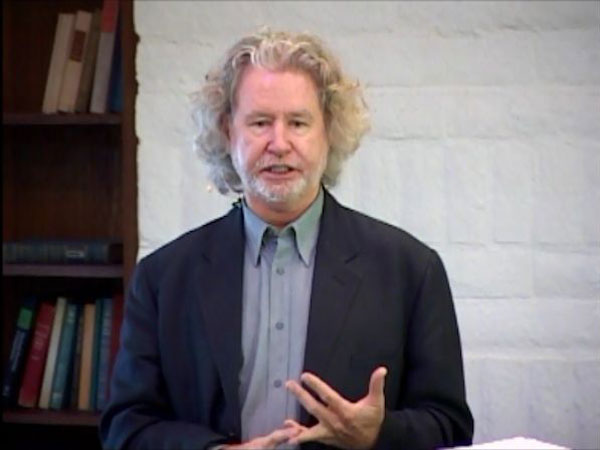
Mind, Mood and Happiness: Transforming the Self
“If you realize that all things change, there is nothing you will try to hold on to. If you are not afraid of dying, there is nothing you cannot achieve.” ~Lao Tzu
Studies in the fields of health psychology, neuroscience, and learned optimism confirm that people can learn to change their thinking and behavior in ways that enhance happiness and well-being. For 2,500 years, the wisdom teachings of the East have utilized what their texts refer to as “skillful methods” for the study and transformation of the mind/body. These meditation and visualization practices help cultivate self-regulation through awareness, concentration, mindfulness, and other attention skills. This leads to clarity of mind, spaciousness of self, and greater compassion.
Using techniques from modern creative psychology, mindfulness and Gestalt practices, neuroscience, creative thinking and non-dual teachings, participants will be taught skills to calm the mind, develop a mindful brain, regulate mind/body states, develop trust with the unconscious, and explore inner resources for activating creativity, vitality, and well-being.
Methods include:
- Meditating and practicing psychological skills to promote insight as well as create new neural pathways for healthy and creative brain development.
- Exploring natural mind/body healing rhythms (yogic exercises and somatic breathing methods).
- Exploring Mindfulness & yogic practice and somatic expressive methods for amplification, containment, and release of affect (feeling states).
- Discovering practices that promote loving-kindness (metta).
These skills are especially applicable for both self-healing practices and for health care professionals in their work with patients.
Recommended reading: Alexander, Wise Mind Open Mind; Fryba, The Art of Happiness: Teachings of Buddhist Psychology; Suzuki, Zen Mind, Beginner’s Mind.
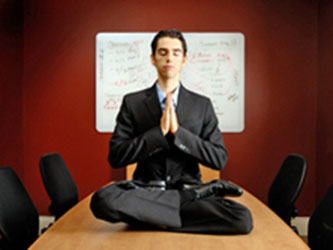
Mindful Leadership and Coaching: The Art of Communication, Creativity and Vision
“A leader is best when people barely know he exists, when his work is done, his aim fulfilled, they will say: we did it ourselves. “ ~Lao Tzu
This workshop is for individuals interested in exploring an intensive experiential process to become more effective as mindful leaders both in personal and professional life settings. Designed for entrepreneurs, executives, managers, health care professionals and others committed to improving their communication and leadership skills, it is especially intended for those open to doing deep personal work to transform the self. The major areas of focus will be: resolving conflict, developing trust with those who feel threatened, addressing blind spots in self-esteem, healing blocks in creativity, and building support for transforming vision into reality.
The workshop includes Gestalt open seatwork, sharing feedback on leadership and communication styles, improving coaching skills, developing the unconscious to creatively solve problems, mindfulness meditation practice, role-playing exercises for real-life work situations. We will also explore the functions of building and shaping mindstrength, a power tool for change that enables you to enter and lead from the state of Big Mind, Wise Mind and Open Mind. This workshop may have up to 35 participants.
“Leadership and learning are indispensable to each other.” ~John F. Kennedy
Recommended Reading: Ronald Alexander, Wise Mind, Open Mind: Finding Purpose and Meaning in Times of Crisis, Loss and Change (New Harbinger Publications); Heider, John, The Tao of Leadership; Bennis, W. On Becoming A Leader; Goss, Tracy, The Last Word on Power.

The Art of Meditation and Mind-Body Mastery
“Learning to observe experience from a place of stillness enables one to relate to life without fear and clinging. One begins to accept pleasure and pain, fear and joy, and all aspects of life with increasing equanimity and balance. Life is seen as a constantly changing process”.
– JACK KORNFIELD, Seeking the Heart of Wisdom
OpenMind Training provides instruction in meditation and mind/body healing from both a psychological and spiritual perspective. The focus is on the practice, experience and benefits of meditation and self-healing in daily life.
Meditation helps to cultivate self-regulation through relaxation and the development of attention skills. Training in mind/body healing facilitates awareness of the inner resources of the Core Self — trust, comfort, time and curiosity — for the activation of the healthy and creative aspects of the unconscious mind. This promotes insight, wellness and individuation.
Meditative techniques of the various Buddhists schools, particularly Tibetan and Zen as well as Advaita-Vedic (non dual) will be explored. These methods utilize mindfulness, insight, visualization and presence to activate physiological and psychological energies whose merger can produce powerful states of mind to penetrate into the reality of our being and experience a spacious quality of freedom. Teachings on the practices and principles of Buddhist psychology and their applications for resolving afflictive factors of mind, mood and happiness will be taught.
Participants will also be taught various forms of breathing, chanting, trance states, and mind/body healing exercises. This workshop can help participants acquire skills to calm the mind, regulate affect states, develop trust with the unconscious, and explore inner healing resources. The workshop is designed for anyone from beginning to advanced levels in these skills.
Recommended Reading: Ronald Alexander, Wise Mind, Open Mind (New Harbinger Publications); Goldstein and Kornfield, Seeking the Heart of Wisdom; Epstein, Mark, Thoughts without a Thinker; Suzuki, Shunryu, Zen Mind, Beginner’s Mind; Rossi, E. The Psychobiology of Mind-Body Healing; Eckhart Tolle, The Power of Now.
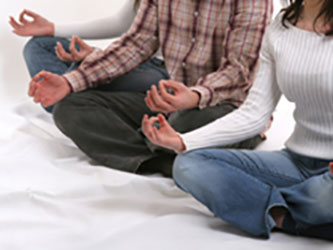
Mindful Zen and The Art of Meditation
For 2,500 years, the wisdom teachings of the east through Buddhist and Vedic meditation practices have developed what is referred to as ‘skillful methods’ for study and transformation of the mind-body process. These meditation and visualization practices help to cultivate self-regulation through awareness training-developing concentration, mindfulness and other attention skills, lead to promoting clarity of mind, spaciousness of self and compassion, will be explored.
Using techniques from today’s self and health psychologies and Tibetan Buddhist schools as well as the non dual teachings (Advaita-Vedic) approach, participants will be shown how to acquire skills to calm the mind, regulate affect states, especially to learn to manage mood fluctuation and anxiety, develop trust with their unconscious and to explore inner resources for activating creativity, vitality and a core sense of well-being in the mind-body process.
People who are described as ‘centered,’ ‘creative’ and ‘pragmatically optimistic’ can generate a vitality and enthusiasm that inspires others to grow and change toward leading creative, productive, healthy and visionary lives.
Methods Include:
- Meditation and psychological skills to deepen concentration, promote insight and presence to activate physiological and psychological well being and promote deep inner strength and balance of mind-body (mediation practices for cultivating the witnessing observer), one pointed focus. The Big View, Wisdom (Rigpa) and Freedom, methods will include teachings and practice from Insight meditation, Tibetan (Dzchogen) and the Non Dual teachings.
- Skills for exploring your natural mind-body healing rhythms (the practices of yogic and somatic breathing methods for pacing and attuning oneself to ones psychophysical flows, (the practice of tracking ones ultradian rhythms) daily working and healing rhythms.
- Buddhist psychological methods for dealing with unpleasant or painful ‘afflictive’ states of mind (the positive meditational antidote remedies for countering afflictive mind and mood states, the framing and re-framing of thought, mood, feeling and sensation.
- Discussion of mind, self, dissatisfaction and happiness from both Western Self-psychology and Buddhist psychology will be explored. Specific practices that promote ‘Metta’ loving kindness(empathic self-compassion for taming the inner critic and the harsh superego) and meditation skills that promote satisfaction and contentment with oneself will be explored.

Yogi/Counselor/Healer/Coach: A Teacher Training Program for Yoga Teachers and Holistic Practitioners
“Leadership is complicated. It has many facets: respect, experience, emotional strength, people skills, discipline, vision, momentum, timing…That’s why leaders require so much seasoning to be effective.”
– John Maxwell, The 21 Irrefutable Laws of Leadership
“In the beginner’s mind there are many possibilities while in the expert’s mind there are few”. –Suzuki
The archetypal role of a yoga teacher and or health practitioner is a blend of “transformer” and “meaning translator.” The transformer creates a sacred space for exploring rhythms, moods, flows and interactions. The meaning translator brings clarity, order and awareness to the conscious and unconscious processes within the healing dyad. Teachers and practitioners are frequently sought out for their wisdom, counsel and support whether it be after class or during private sessions to respond to complex emotional, physical and life issues. There is a growing need and demand for Yogis to become more knowledgeable and especially more skillful when offering or responding to their students multi levels of needs. Effective counseling, leadership and coaching requires that teachers and healers deepen their own self healing experience as well as become more proficient at offering more broad-based approaches that integrate modern western psychological methods, life coaching skills and the eastern wisdom traditions.
The focus of this training begins with fostering openness to explore safety, comfort, trust, and support and to teach skills that will enable participants to artfully manage difficult emotional and psychophysical issues that arise in any setting. This cutting-edge program provides a rare opportunity for sustained education in learning how to apply clinical and intuitive skills for coaching and counseling. It will be taught by psychotherapist Ronald Alexander, a renowned pioneer in mind-body therapies who leads professional trainings and clinical supervision groups in Gestalt therapy, Ericksonian mind-body hypnosis and other integrated modalities throughout the world and is a long-time student of yoga as well as a teacher of meditation and Buddhist psychology for the past 34 years.
The training will include direct experience, clinical demonstrations, practicum, theory and the teaching of clinical skills to support practitioners to become more creative and resourceful when treating body symptoms, trauma, pain, and mood and somatic disorders. Skills to help practitioners navigate complex issues, such as transference and counter transference will also be taught. The modalities we will use for developing clinical skills and deepening our own healing process will include: body-centered psychotherapy, Gestalt therapy, relational psychoanalytic approaches, Buddhist psychology, mindfulness-based practices, non-dual meditation and other mind-body healing methods for accessing the somatic “core-self.”
This workshop is particularly useful for yoga teachers, holistic and all health practitioners, educators, consultant and others who wish to learn to lead, heal, counsel and coach others whether it be on an individual, group or organizational level.

Mindfulness Meditation: Exploring the Self
Learning to observe experience from a place of stillness enables one to relate to life without fear and clinging. One begins to accept pleasure and pain, fear and joy, and all aspects of life with increasing equanimity and balance. Life is seen as a constantly changing process.
For 2,500 years, Buddhist meditation practices have developed what is referred to as ‘skillful methods’ for study and transformation of the mind/body process. These meditation and visualization practices help to cultivate self-regulation through awareness training-developing concentration, mindfulness and other attention skills. Mindfulness Meditation training is known for promoting clarity of mind, spaciousness of self and compassion, will be explored. Teachings on the practices and principles of Buddhist psychology and their applications for resolving afflictive factors of mind, mood and happiness will be highlighted.
Using methods from the Buddhist Mindfulness and Non-Dual (Advaita) schools of mindfulness practices as well as drawing from the contemporary theory’s of self and health psychologies participants will have the opportunity to directly experience, practice and learn clinical skills for promoting insight, wisdom and knowledge. These methods utilize mindfulness, insight, visualization and presence to activate physiological and psychological energies whose merger can produce powerful states of mind to penetrate into the reality of our being and experience a spacious quality of freedom.
People who are described as ‘centered,’ ‘creative’ and ‘pragmatically optimistic’ can generate a vitality and enthusiasm that inspires others to grow and change toward leading creative, productive, healthy and visionary lives.
Day 1. Introduction and overview of Buddhist Schools of mindfulness meditation. Breath control, concentration and absorption training. Qualities of Mind and the Hindrances/Mindfulness practices.
Day 2. Models of the Mind and Self. Contemporary Psychoanalytic and Eastern traditions. A micro analytic treatment cartography for exploring the Real Self, Core Self, False Self and the Non Self. Mindfulness Meditations for exploring the non-self.
Day 3. Mindfulness Meditations for transforming emotions/learn clinical skills for regulating affect states/ mind/thought and somatic energy patterns. Stream entry and pointing out instructions.
Day 4. The Roots of Buddhist Psychology/ Attention strategies for calming the mind/deepening insight/cultivating the Witnessing Mind/ Mindfulness and practices from the Non dual- (Advaita)
Day 5. Qualities of mind/mood and happiness/ Antidote remedies to manage anxiety, mood fluctuations and other unpleasant afflictive mind states/ transforming unwholesome mental factors into wholesome/explore inner resources for activating creativity, vitality and a core sense of well being in the mind/body process. Practices for deepening wisdom and Samadhi.
Recommended Reading: Ronald Alexander, Wise Mind, Open Mind: Finding Purpose and Meaning in Times of Crisis, Loss and Change (New Harbinger Publications); Goldstein and Kornfield, Seeking the Heart of Wisdom; Epstein, Mark, Thoughts without a Thinker;. Suzuki, Shunryu, Zen Mind, Beginner’s Mind; Eckhart Tolle, The Power Of Now